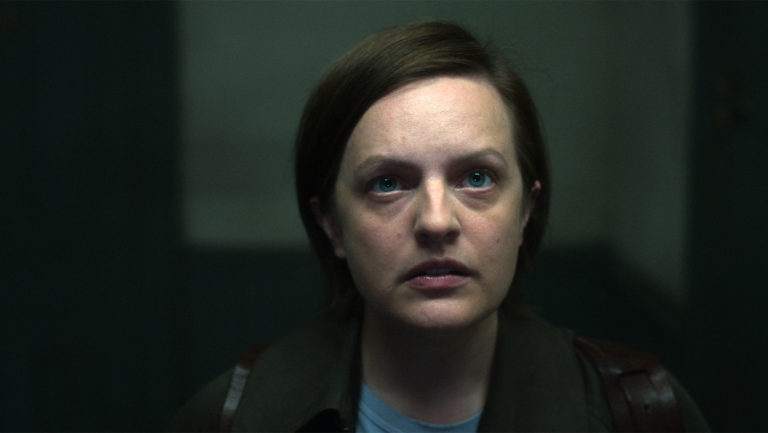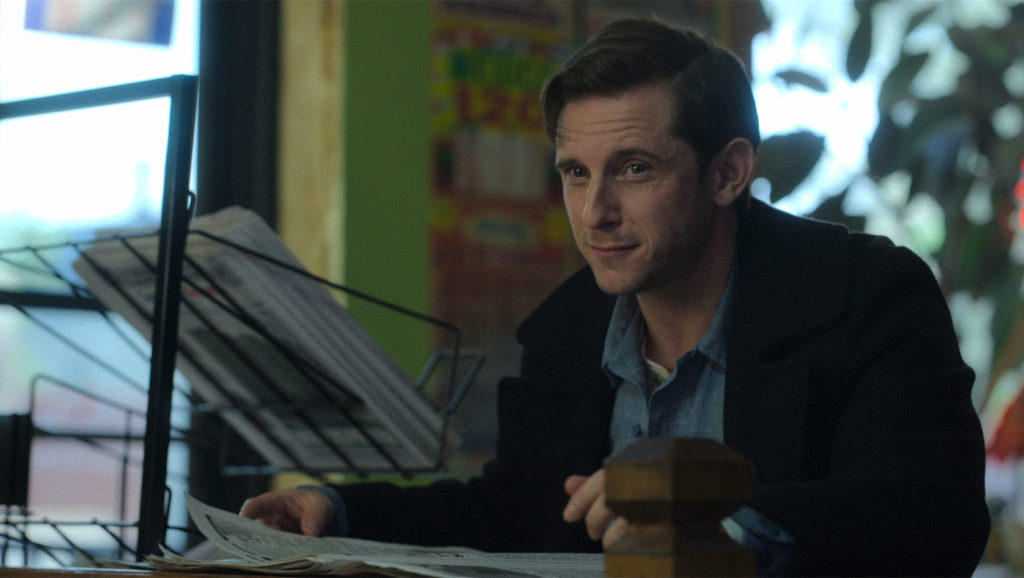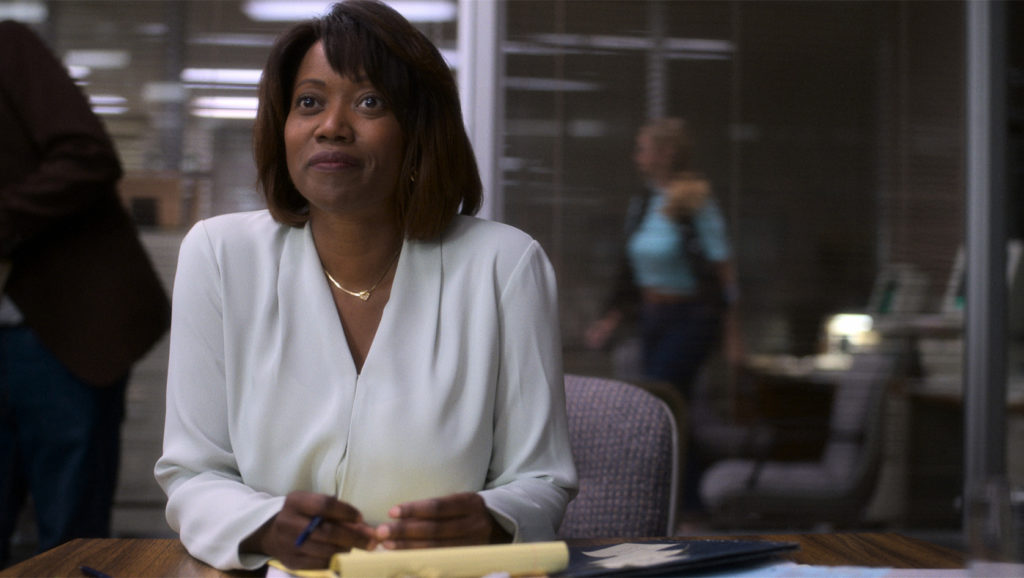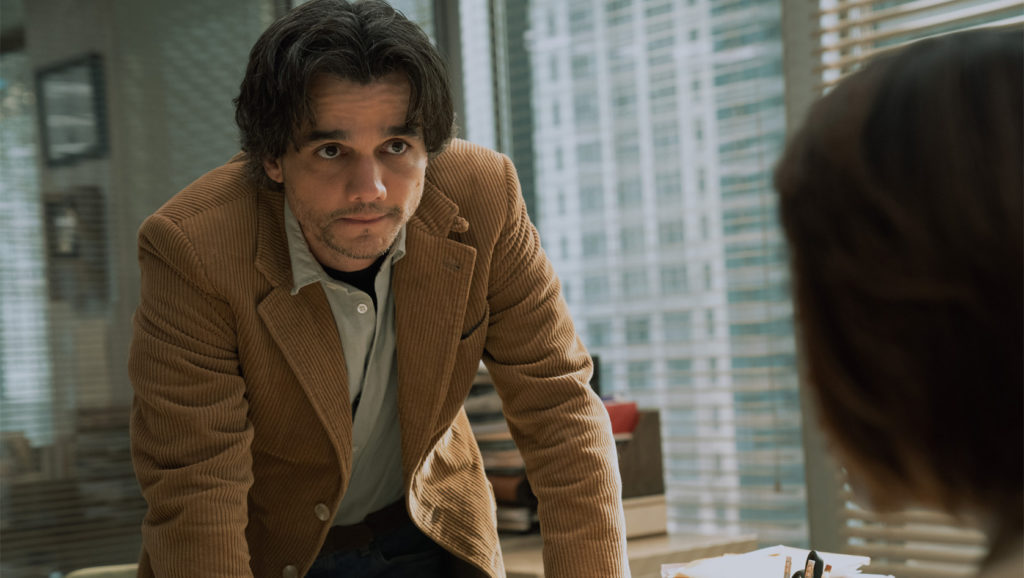
A screen adaptation of Lauren Beukes’ best-selling sci-fi/horror/mystery novel, Shining Girls, is now streaming on Apple TV+. Written by Silka Luisa and produced by Michelle MacLaren, the series follows Kirby Mazrachi (Elisabeth Moss from The Handmaid’s Tale), a Chicago newspaper archivist whose memory is rendered unreliable after she survives a horrific assault at the hands of Harper Curtis (Jamie Bell from Turn: Washington’s Spies), the time-skipping serial killer terrorizing women over the course of several decades.
Helping Kirby piece together the mystery is alcoholic journalist Dan Velazquez (Wagner Moura from Narcos). The cast also includes Phillipa Soo, Chris Chalk and Amy Brenneman.

Cinema Daily US recently participated in a virtual round-table chat with Jamie Bell and Wahner Moura.
Q: Harper is very enigmatic in the first few episodes. Was it challenging to calibrate your performance so you didn’t give too much away?
JB: Yeah, a little bit. And, also, just in terms of doing the show in the first place. When you read it you go: “Yeah, OK, I get it. He’s the villain.” It’s clear up front that he has some eccentricities and everything else, but I don’t really know what the heart of him is. I don’t know what the foundation of him is.
Q: How did you figure the character out?
JB: Silka and Michelle gave me later episodes, which I don’t even really think were completed at the time. They were just kind of outlines of ideas. I knew that the novel was there and I could kind of rely on that as something, but our character is a little different than he is in the book. It was tricky. The first kind of episode of two, I did kind of feel a little bit at sea, in terms of: “What do I have to hang onto here? What do I have to plant him in the ground?”
Q: What did you eventually find to anchor him?
JB: I just kind of messed with the idea of control. That’s the thing that compels him. That’s the compulsion. The gratification is seeing these women terrified for their lives. That excites him. It’s thrilling. It’s like a drug. He just can’t put it down. He has to have it. So playing with that — understanding where that comes from, maybe, where that emanates from. I think we all have a morbid fascination with what makes these people do these kinds of things. I guess, for me, that was kind of the journey of making this. Could I have a better understanding of why somebody maybe does something like this?
Q: How did you balance the book with the script and your own creativity?
JB: I loved the book. I thought the book was really compelling and interesting and, obviously, certain characters really [are different.] Dan is probably the most different from the book — the character Wagner plays. There is lots in the book that was really great and Lauren gave me a copy of her book and she wrote this incredible inscription that I am desperately trying to remember because it would make me sound… well, it would make HER sound specifically very clever. She is very clever, obviously…
It was this idea that [Harper] needs control over everything because the idea that things just happen randomly is terrifying. It’s the idea that if things are set in stone and you can control them and bend and change them at your will, that’s kind of like the power of a god. It’s an incredible ability when you think about it. … One thing I didn’t take from the book is that he is handsome [laughs] because there is very little that I can do about that. There’s almost like a suaveness to him. There is also like an immediate viciousness in the book. Because the book has the ability to see things from his point of view, you can kind of have that, whereas, in the show, we’re experiencing Harper through other people, mainly. It’s how Dan finds him, or how Elisabeth finds him or how Phillipa is engaging with him. It’s kind of a different way into character, what you’re experiencing, so we had to modify and change it a little bit. But it is just a study in behavior for me, really. I was more interested in what he does when he is alone more than anything, but we don’t really have time for that.

Q: When you are exploring such darkness as work, how hard is to leave that behind when you go home?
JB: I always think I’m so great, not GREAT at it, but that it’s so easy to clock off. Like, “That’s that.” You can always tell from the people around you because they will tell you: “You are a little bit…” or “Can you relax a bit, please?” or whatever. But I think this was OK. I use a lot of music to find where things should sit. I listen to a lot of music. But the physical stuff was genuinely hard to do. It was less about, “Is it hard to get away from?” It was more that it’s hard to get into. Some of the physical stuff was like really… I never really [before] had that sensation of, “Oh no, I actually just genuinely don’t think I can do this.”
Usually, I’ll just jump off a cliff and go: “I don’t know. How was it? Who knows? You never know!” … Because when you read physical violence or physical stuff in scripts, you just immediately go to: “Well, that’s a stunt and that’s either not me or it’s really rehearsed and it becomes [almost casual.]” Violence like this is so different because it is centered in a much different place because this is gratification for someone. This is excitement. This is thrilling. This is intimate, almost in a sexual kind of way. On this show, that was the way we looked at these scenes. This should be treated almost the same as a sex scene. This is really, really profoundly intimate. That stuff was more hard to get into and I was very happy to leave that stuff behind.
Q: What can you say about where Dan is in his life and career when we first meet him?
WM: Oh, he’s in a very difficult situation. We see him in the first episodes coming back [to work] from a leave of absence, but we don’t really know what happened or why. I think it’s a character that you start to learn more about him after Episode 3 when we understand that he has a kid. He is raising this kid by himself. He has this alcoholism issue. He is a character trying to get his life back on track and I think this is an interesting thing. The thing I like more about this show, for me, is the relationship between Kirby and Dan because they recognize in each other very similar wounds and scars and that puts them together in a very beautiful way.

Q: Why do they initially join forces?
WM: It starts as a professional thing. He wants to crack that story in order to regain that position that he used to have at the Sun-Times. He used to write a column there and now he is just a journalist trying to come back, but then after he meets her and he starts to look at her, things become more personal. He really wants to help that woman find her voice again and, by doing that, his voice is coming back again, too.
Q: Not only is Dan trying to redeem himself and help Kirby, but he’s also trying to protect other women from being hurt, isn’t he?
WM: Definitely. This is a very interesting series, right? Because it is a mix of genres. It’s a crime story, but there are also elements of sci-fi, but, in its core, Shining Girls is about femicide, for me. It’s a big issue and it is something that resonates a lot with me, coming from Brazil, a place where, unfortunately, this is happening a lot. Women being killed just because they are women. I think, for Dan, it is also an important thing to stop it and use journalism as a social tool, which I believe is on of the things journalism is about. To raise these kinds of questions, so people can read about it and talk about it, and, hopefully, try to change it.
Q: What is it like exploring a partnership when neither Dan nor Kirby trusts themselves or their own memories?
WM: How can he trust — being a journalist — and not be able to verify what she is saying? It’s so hard for him. But there is something about her that feels real and recognizable for him from his personal life. … I like the fact that they recognize each other as similar, but they don’t open up to each other like that [snaps fingers.] It’s a very slow thing. They start to give a little bit about their personal lives to each other until the point that they are really connected and try to know what’s going on and, at the end of the day, to protect other women, so it won’t happen again.
Q: Dan never takes off that brown corduroy jacket in the show’s early episodes. Does he see that as his armor in a way?
WM: It’s so nice that you read that! Our costume designer came up with that outfit, which I thought was nice, very ’90s. But not very young. It’s for a guy my age — 45 — back in the ’90s. I love that because I was able to put my hands in the deep pockets of that jacket and that sort of protected me, especially in the beginning of the series where I think I am more vulnerable. … [It was] like a shell.
Check out more of Karen’s Articles.
Here’s the trailer of the series.

